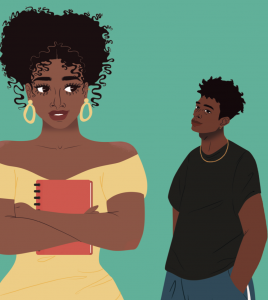May’s Big Picture
 Excuse Me While I Ugly Cry
Excuse Me While I Ugly Cry
by Joya Goffney
“You have to be better than that if you want to compete.” This is a pressure eighteen-year-old Quinn Jackson, the only child of successful, wealthy Black parents, knows well. As one of only a few Black seniors in her privileged Austin high school, Quinn has always felt the need to succeed far beyond average, while struggling to navigate a world that always judges her as acting white or acting Black. To deal with the pressure (and to help maintain a façade of the happy overachiever even as she struggles academically), she keeps a journal full of very personal lists: favorites, fantasies, how-tos, to-dos, secrets, and lies. Then the journal goes missing, and Quinn suddenly finds herself being blackmailed with an awful threat: complete the fear-inducing challenges from her To Do Before I Graduate list, or all her secrets (including some serious misrepresentations—okay, lies—to her parents) will be shared online. In desperation, she turns to intriguingly handsome, infuriatingly judgmental fellow Black classmate Carter Bennett, who may be her hero or might just be the culprit.
There’s a lot of melodramatic familiarity to the underlying story here; with its blackmail plotline, its list of dares-turned-adventures, and its diamond-in-the-rough love interest, it could easily sit on the shelf beside Pretty Little Liars or Lockhart’s The Disreputable History of Frankie Landau-Banks (BCCB 3/08). There’s certainly commonality to Quinn’s situation, to the pressure she’s under, and to her list-making, journal-writing coping mechanism. Yet while many a teen reader may identify with Quinn’s struggle to be the overachieving person everyone expects, that pressure is depicted here with the added weight of race-focused realities that give the novel a notable substance and distinctive viewpoint.
The journal at the novel’s center thus serves as more than just plot device; it’s also a script for the person that Quinn is pretending to be and a roadmap to the life she thinks she should be living, and the various lists that populate the text provide witty character insights into the real Quinn behind the successful, accommodating mask. Its loss is therefore as poignant as it is dangerous; it gives Quinn the freedom to go off-script while forcing her to acknowledge the comfort she finds in pretending. The journal also provides a window into the role that race plays in Quinn’s act, as it hides not just her secret crushes, low test scores, and faked college acceptances, but also her pain at being called an “Oreo,” her guilt at taking part in popular white girls’ bullying of a talented Black scholarship student, and the fact that she pretends to be “cool with [her] white friends saying the N-word.” Surrounding prose then fleshes out the harshness of micro and not-so-microaggressions that inform Quinn’s need for the journal, from snide comments about affirmative action to “jokes” about Quinn being “practically white.”
The portrait of a girl divided sets up a contrast with romantic lead Carter and nervy new friend Olivia, who round out Black supporting characters with nuance. It hints at what Quinn ultimately admits: that her defensiveness about of Carter’s judgment and her former bullying of Olivia were an expression of her self-doubt in the face of their confidence. That’s why it’s so essential that Carter and Olivia become unexpected allies, helping Quinn tackle truths she’s been too scared to face and having some surprising, sometimes sweetly romantic fun along the way. These relationships create space for the novel’s honest but never heavy-handed reflections about race, language, and identity.
Teen readers looking for a feel-good story that doesn’t ignore the harder issues will appreciate an ending that sees relationships mended, bullies vanquished, and future assured. While the latter two are achieved with an easy success that’s a little implausible, it’s Quinn’s honesty that opens the door for help, and it’s a “true to oneself” moment that deserves celebration. Ultimately, with this confidently crafted #ownvoices debut, Goffney gifts readers with a smart, engaging, banter-filled story about the courage it takes to shred plans that just aren’t working anymore and the rewards of gaining self-assurance.
–Alaine Martaus, Reviewer
Image from Excuse Me While I Ugly Cry © 2021 reproduced by permission of Abrams.
May’s Stars
Lukoff, Kyle Too Bright to See. Dial, 2021 [192p]
Trade ed. ISBN 9780593111154 $16.99
E-book ed. ISBN 9780593111161 $9.99
Reviewed from digital galleys R* Gr. 5-9
Patrick, Cat Paper Heart. Putnam, 2021 [304p]
Trade ed. ISBN 9781984815347 $17.99
E-book ed. ISBN 9781984815354 $10.99
Reviewed from digital galleys R* Gr. 4-7
Perkins, Lynne Rae The Museum of Everything; written and illus. by Lynne Rae Perkins.
Greenwillow, 2021 [40p]
Trade ed. ISBN 9780062986306 $17.99
Reviewed from digital galleys R* 5-9 yrs
Turk, Mariko The Other Side of Perfect. Little, 2021 [336p]
Trade ed. ISBN 9780316703406 $17.99
E-book ed. ISBN 9780316703420 $9.99
Reviewed from digital galleys R* Gr. 8-10

